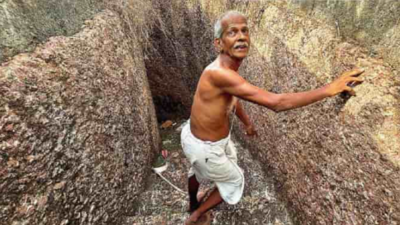ARTICLE AD BOX

Everyone said digging a well here was impossible,” says 76-year-old Balakrishna Aiya. The topic of the conversation is Maddi-Tolop and the resident of Loliem in Goa’s Canacona is talking about how he worked through rock to bring water to the tiny community.
It is a story as much of determination as ingenuity.Maddi-Tolop means ‘rocky area’ in Konkani. Water represented a constant anxiety for its residents, but experts had long written off the area due to its treacherous terrain: a rocky upper crust, followed by clay, and then solid black stone beneath. The geological challenges were formidable, but Aiya saw possibility where others saw only stone.“I studied the land,” he recalls.
“Then I had an idea nobody had tried before.” His innovation was practical yet revolutionary. The trick, he figured, lay in being able to dig deep for water. But that was an enterprise that involved the considerable risk of getting trapped beneath boulders if the shaft caved in.So, Aiya designed an unprecedented safety feature: a stairway from the ground level down to the clay level, creating an escape route for workers who could then dig deeper, secure in the knowledge that they had a way out if the earth became unstable.
But he wasn’t just content with solving his own water issues. He laid pipelines to connect his water source to 25 other households in Maddi-Tolop .Those who know Aiya say that’s typical of the man who is an inno- vator, artist and an unlikely hero in equal parts. If locals are effusive in their praise, Aiya has also been recognised for his work with awards from the Goa State Biodiversity Board. He’s also a recipient of the Kala Gaurav Puraskar.A restless creator, he crafts everything from Ganesh idols to brooms. In fact, adapting to the situation is Aiya’s forte. In his younger years, when he discovered schools were hiring art teachers, he pursued an elementary drawing teachers’ course and went on to teach at a local school for 17 years. That’s how idol-making happened — as a means of supplementing his income after he’d taken voluntary retirement from school.
He also doubles as a pandit to find additional ways to support his family. As for brooms, he actually devised a tool for making the latter.Catch him at work making brooms and you will notice a peculiarly shaped knife. “This is my own design. It trims the ribs at exactly the right angle.” Using the instrument, within minutes he transforms what looks like an ordinary bundle of dried palm fronds into what locals insist is the finest broom in Canacona.
The secret lies in a special binding technique and custom grip that Aiya perfected after years of experimentation.His brooms sell for Rs 250-300 each. Producing between two and six brooms daily, Aiya has turned a common tool into an art form. Now, he is keen to pass on his craftsmanship to the younger generation. “What good is knowledge if it dies with you?” he says to articulate his philosophy. “What good is innovation if it doesn’t help your neighbour?”



.png)
.png)
.png)
















 1 week ago
5
1 week ago
5









 English (US) ·
English (US) ·